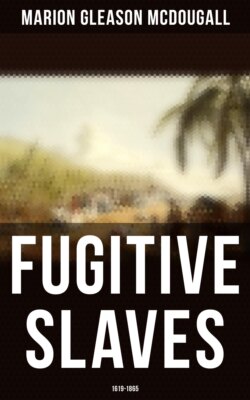Читать книгу Fugitive Slaves (1619-1865) - Marion Gleason McDougall - Страница 18
На сайте Литреса книга снята с продажи.
The Second Fugitive Slave Act.
Оглавление§ 29. The second Fugitive Slave Act (1850).—In the early part of the first session of the Thirty-first Congress, Mr. Mason of Virginia introduced a bill to make the provisions of the fugitive slave act more severe,155 and the bill was reported from the Committee on the Judiciary, January 16, 1850. Two additional amendments were soon offered by Mr. Mason. The first imposed a fine of one thousand dollars and imprisonment for twelve months upon any one who should obstruct the execution of the law. The second provided that the testimony of a fugitive should not be admitted. Mr. Seward, in opposition, proposed on the 28th to allow a fugitive the right of trial by jury, with a fine of five thousand dollars and the forfeiture of office should the right be disallowed by any judge or marshal.156
Mr. Clay's "Omnibus Bill," by which he intended to settle the territorial question then before Congress, and at the same time to check the antislavery movement, contained a fugitive slave clause, though not so severe in its provisions as Mr. Mason's.157 This bill, however, was not debated as a whole, but each proposition considered separately, and thus Mr. Mason's bill became the basis of the fugitive slave provision in the Compromise of 1850.
The measure was considered, and various amendments were offered, until August 26, 1850, when it was passed by the Senate, and a few days later by the House;158 the signature of President Fillmore was readily appended, and it became law, September 18, 1850.159
§ 30. Provisions of the second Fugitive Slave Act.—Every provision of the act was arranged for the protection and benefit of the slaveholders. It was based upon the law of 1793, but a number of new regulations were added.160 Commissioners were to be chosen by the Circuit Courts of the United States and the Superior Courts of the Territories, to act with the judges of those courts in fugitive slave cases. Such commissioners could be fined one thousand dollars for refusing to issue a writ, and were liable for the value of any slave escaping from them. The testimony required for rendition was the official declaration of the fact of the escape of a slave by two witnesses, and the establishment of his identity by oath. The testimony of the accused could not be admitted. The right of trial by jury was not affirmed, and was therefore practically denied. A sheriff might call upon any bystander for help in executing the law, and the penalty for harboring or aiding in a rescue was increased from five hundred dollars, as in 1793, to one thousand dollars, and imprisonment for not more than six months. Should the slave escape, damages to the same amount were to be paid to the claimant. If a mob were feared, military force might be employed; and by a discrimination little likely to win respect for the act, the fee of the commissioner was to be increased from five to ten dollars whenever the case was decided in favor of the claimant.
